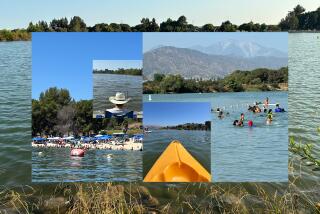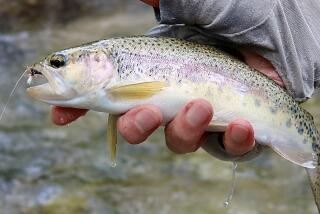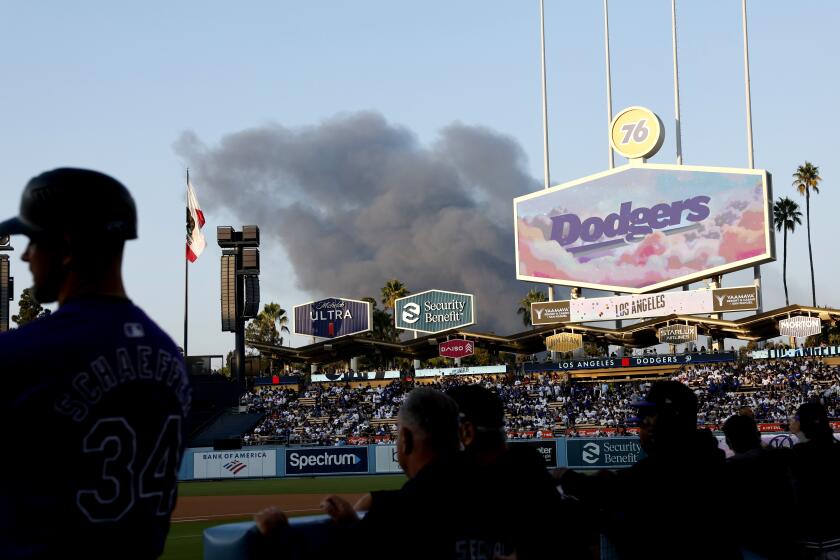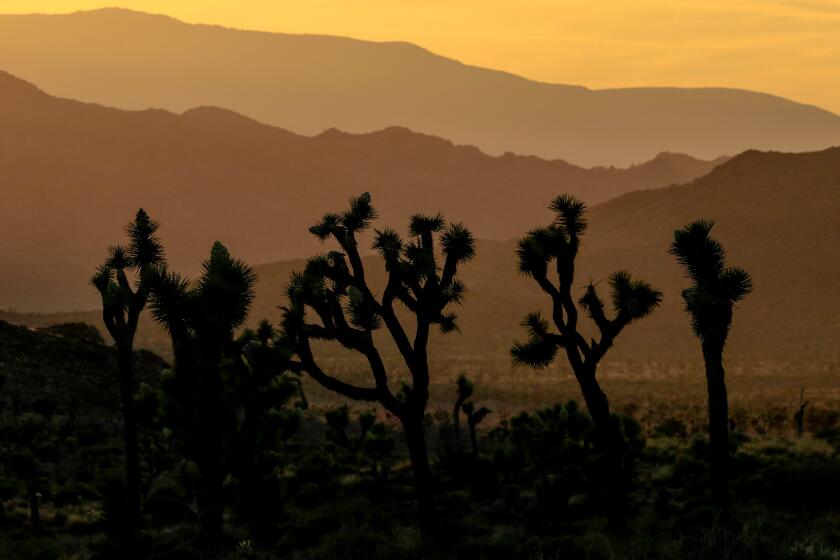Real fishermen in their habitat
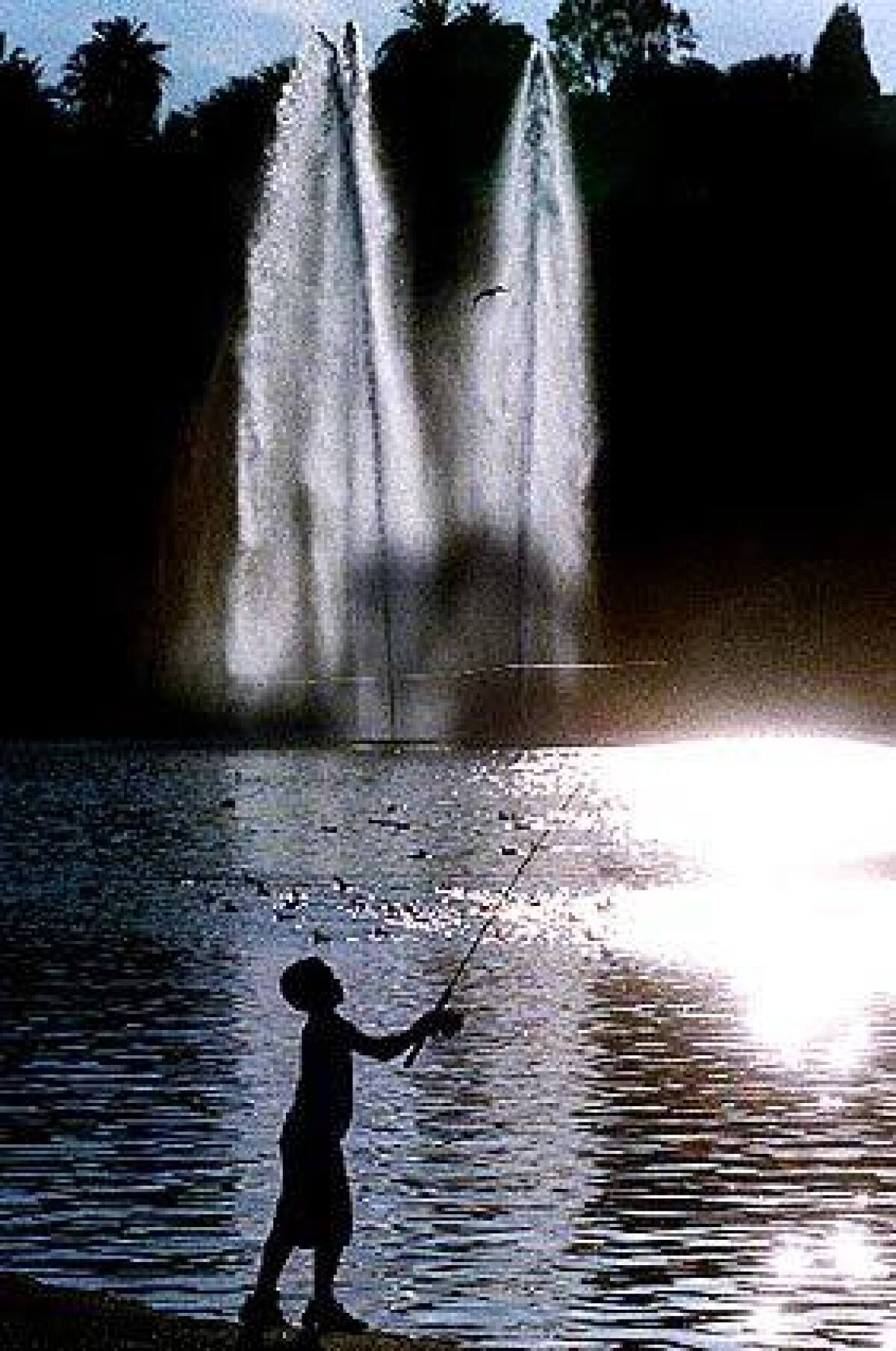
My new angling pals at Echo Park Lake had never seen a trout fly until I pulled a box from my fishing vest and opened it. My ties look good, and they seduce wily native trout.
The boys peer in, “Are they real flies?”
We’re at the old boathouse this summer day as I share my 45 years of experience on this small lake. I give Eduardo Balldovenos, 13, and Kevin Ramirez, 12, each a woolly bugger, a deadly subsurface pattern, and tie the flies with a simple clinch knot. Eduardo casts his spinning outfit with 4-pound line and hooks a small bass.
“Look at me, foo’! I got him!” he yells to Kevin.
“We’re fishing with a real fisherman!” shouts the other boy.
But to me, the boys are the real fishermen. Their joy for the sport is pure. I watch them and reminisce about the many days I spent here as a new fisherman back in the ‘60s. I was a wild kid who learned to fish and found patience and peace at the lake near downtown Los Angeles.
Echo Park Lake has taught many generations of Angeleno anglers. And now, in its 110th year, these 15 acres of murky green water remain a fish-producing wonder. The old-timers have always known it; the newcomers want to keep it secret.
The Korean fishermen have the carp figured out. Dosah Kwak and Shin Lee, fortysomethings from L.A., are masters. Decked like L.L. Bean trout fanatics, they use ultra-sensitive 14-foot graphite rods, umbrellas for shade and stainless steel rod holders. They fish as quietly as stalking herons.
At night, when carp roil the surface, the fishermen rig adjustable floats with tiny, green lights bobbing against dark water. It’s a carp massacre.
But the bass guys at Echo Park are most impressive. They quest for the cagiest fish in the lake — the Florida-strain largemouth bass. It is not an easy fish to fool.
Renowned for their wariness, bass are eating machines, inhaling bluegills, sunfish, crappie, crayfish, even baby bass into their huge maws. As a boy, I remember panfish were more common before these brutes arrived.
Vincent Montalvo, who some call the Legend of the Lake, says the big bass will explode into a group of ducklings. And one will disappear. He and his bassing pals worked with the Department of Fish and Game to stock Florida bass after the lake was drained in 1984.
Rocks were placed on the bottom to help bass ambush prey, and a spawning habitat was installed along the shoreline. A fountain aerates the lake. Rainbow trout were added, but bass devour them.
The dedicated bassers mimic their quarry: a silent and secretive bunch. I coax one angler to talk about his passion late one night.
His name is Michael, and he comes many nights from La Cañada-Flintridge via the Glendale Freeway. He casts into shadows on the water, his retrieve is deliberate as he crawls a plastic worm along the bottom.
He’s guarded, but relaxes when he learns that I, a fly-fishing trout fanatic, protect my favorite waters just as he cares for Echo Park Lake. Our gear and methods differ, but we meet on the bank of shared fishing concerns.
Michael’s seen guys net and snag fish, take them without licenses, hook small bass and discard them. “I’ve called CalTip to report poachers,” he says above the din of traffic on the Hollywood Freeway, “but haven’t seen any response. This place is going to get ruined.”
I nod in agreement, but I think the fishery will survive just as it always has.
Later, when Eduardo and Kevin are fishing, I rig my split-bamboo fly rod, an upgrade from the cane pole I used as a boy. My fly lands exactly where I’ve looked (years of casting in small streams will do that) and a big, dark shape rockets toward the fly. I lift the rod, set the hook, but it feels the sting of the hook and the fish is suddenly gone.
My trout leader was overmatched, but I’ll see the monster again. I know where he lives. Somewhere in the green depths of Echo Park Lake.
More to Read
Sign up for Essential California
The most important California stories and recommendations in your inbox every morning.
You may occasionally receive promotional content from the Los Angeles Times.

